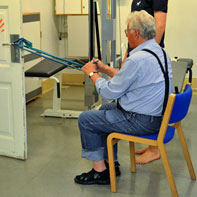Utilisation of high-protein diets by elderly people
This project will provide useful knowledge to adjust the recommendations for increased protein intake to combat the age-related loss of muscle mass in elderly people.
PROJECT IS COMPLETED
Period: 2014 - 2018
Beyond the age of 50 years, the healthy body starts to lose muscle mass with an annual rate of up to 1-2 percent. If left untreated, this will lead to decreased muscle strength and may result in loss of independence and quality of life.
The age-related loss of muscle mass is likely to be counteracted if elderly people increase the level of protein in their diet and continue to exercise.
The aim is to contribute to formulating beneficial strategies for protein intake and exercise to combat age-dependent muscle loss.
Milk proteins are increasingly used in dietary supplements. In this study, we investigate the effect of supplementation with whey and casein on protein uptake in elderly people. The results will provide novel in vivo data.

We are investigating:
• How increased amounts of protein are utilised in the body and whether such utilisation is affected by the amount of protein intake that an elderly person is used to.
• Whether different kinds of protein (here whey and casein) are taken up and metabolised differently in the body.
• Whether prior muscle contractions affect how these proteins are used for muscle remodelling.
• Whether these parameters are influenced by the protein level that the elderly person is used to.
Supported by results from a parallel long-term intervention study (Counteracting age-related loss of skeletal muscle mass – CALM), it is anticipated that new products will be developed scientifically with a high content of whey protein.
Funded by:

Project: Utilisation of high-protein diets by elderly people
Original title: Indflydelse af kostens totale proteinindhold og akut træning på udnyttelsen af vallesupplement og måltidsindtaget kasein
Period: January 2014 - January 2018
Funded by: Danish Dairy Research Foundation
FOOD grant: DKK 952,400
Total budget: DKK 4,934,000
Total grant: DKK 2,469,000
Contact
Dennis Sandris Nielsen
Professor with special responsibilities
Microbiology and Fermentation
